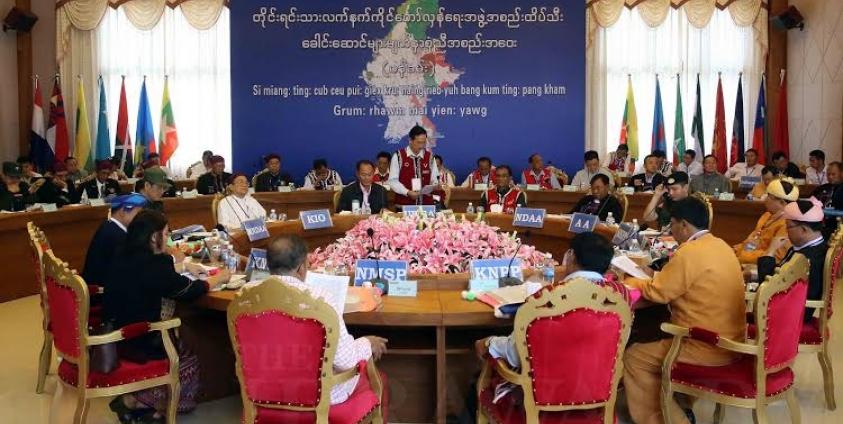Non-state armed groups (NSAG) that didn’t sign or were prevented from taking part during last year’s controversial nationwide ceasefire agreement (NCA) have announced they will defend each other against further attacks during a second summit in Panghsang, the United Wa State Army (UWSA) Special Administrative Region 2. Only NCA non-signatories were invited to the summit.
Maj. Mai Aik Kyaw, information officer of the Palaung State Liberation Front/Ta’ang National Liberation Army (PSLF/TNLA); one of the groups that is fighting with the Burma Army and Restoration Council Shan State (RCSS), claimed that the army was using the NCA as a divisive tool against the ethnic minorities.
“The ethnic people take up arms to resolve political issues. As I see it, the Burma Army has been using RCSS to wage war against us. Nothing happened in the northern Shan State before the NCA was signed. There were MNDAA, KIA, SSPP, UWSA, and other groups [in the northern Shan State]. Everyone cooperated together. Now, the RCSS marched from the south to the north after signing the NCA. There is a long distance [between the north and the south]. There are many Burma Army battalions there. Why didn’t they stop them? Now, they [the Burma Army] only ask them [RCSS] to go back after war has started. RCSS said they are not going back. In my opinion, the Burma Army has been creating these conflicts,” said.
The Panghsang summit was attended by 34 representatives from UWSA, Kachin Independence Organization, KIO/KIA, SSPP/SSA, PSLF/TNLA, MNDAA, ULA/AA, NDAA, to discuss the current political situation in the country.
The final statement stated all the concerned groups expressed interest in cooperating with the new government in line with the consensus reached from the two Panghsang summits. It called for political dialogue in order to build peace in the country, an immediate ceasefire between the RCSS and the TNLA and for the Burma Army to cease its offensives in northern Shan State.
RCSS leader Lt-Gen Yawd Serk said they expanded their troops in northern Shan State because the public wanted them to. He accused the TNLA of starting the problem.
“The TNLA has been detaining the Shan people and trying to create an ethnic conflict. I want to know who is supporting the TNLA from behind. We are ready to meet and discuss with the TNLA. I don’t want to meet anyone else,” he said told the media in Rangoon early last month.
Starting in late November heavy fighting between the RCSS and the TNLA has erupted in Kyaukme, Kutkai, and Namhkam townships. Since March, fighting with the RCSS has subsided but it has increased between the Burma Army and the TNLA. Over 4,000 local residents have already been forced to flee from their homes.
Translated by Thida Linn
Edited by BNI Staff








